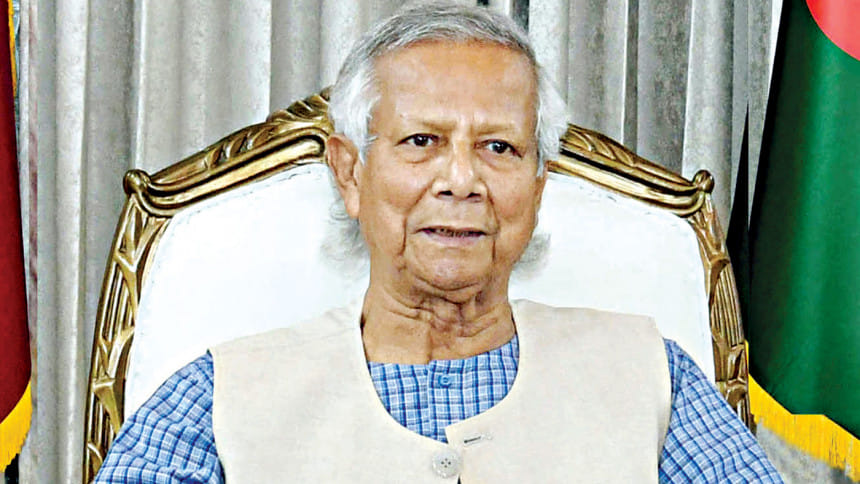Yunus’ address: It presented a clear vision of Bangladesh

Muhammad Yunus, the chief adviser to the interim government, has presented his vision with objectivity and assured his government's commitment towards the countrymen in his televised address to the nation, said eminent citizens.
The speech has met the expectations of the people, said Iftekharuzzaman, executive director of Transparency International Bangladesh.
"Without any verbosity or rhetoric, Yunus, as expected of him, provided straightforward responses to a whole range of issues that have been agitating the minds of the people in the prevailing extremely challenging circumstances."
The speech strongly emphasised equality for everyone irrespective of any marker of identity and fundamental rights and justice without any form of discrimination.
"One could easily find in the speech a true articulation of the underlying spirit and aspirations of 'New Bangladesh' as pronounced by the unprecedented student-led people's movement."
The emphasis against corruption and money laundering has raised expectations and would motivate the relevant institutions to take action to set concrete examples that abuse of power, especially at high levels, can no longer be enjoyed with impunity, Iftekharuzzaman said.
Yunus has rightly conveyed the message that it is upon the people to determine when the much-needed elections will be held.
"There is no denying that one of the deliverables of the interim government is the restoration of people's right to vote as the means of transition of power. But the election cannot be regarded as an end in itself without meeting the key aspirations of the movement," he added.
In his address to the nation on Sunday, Yunus requested the people to discuss and prescribe what is the least the interim government needs to do, said Serajul Islam Choudhury, professor emeritus at the University of Dhaka.
"Our expectation is that an election should be held and for that, a proper atmosphere should be created."
At the very least, the expectation is that due honour will be given to the aspiration of liberty.
There are several other expectations such as proper treatment for those injured during the mass upsurge and financial compensation for the families of those killed.
"Perpetrators of these murders must be brought to book. There is a need to rein in the immense powers given to the police and the RAB. Efforts should be made to stop wealth laundering, plundering and corruption."
Ramping up employment generation, bringing prices under control, ensuring freedom of expression and dismantling all types of syndicates are crucial.
Furthermore, adopting a policy of development towards social ownership and moving away from the trend of capitalist development is also essential.
"If you can ensure this, an atmosphere of polls will be created. This should not take that much time. There are proposals of different reforms and commissions but those are time-consuming exercises," Choudhury added.
In his statement, Yunus highlighted that a key priority for the interim government is to seek justice for the hundreds killed and thousands injured during the July Protests, said Sara Hossain, a Supreme Court advocate and a rights activist.
"He also said it out loud and clear that no one should face injustice when seeking justice. I hope the government will act on this and take swift measures to bring to account some of those responsible for the gross human rights violations we have just witnessed, and also stand by the victims, remembering the long history we have in our country of impunity across the years."
It was good to hear Yunus emphasise the importance of respecting each other irrespective of ethnicity, religion or gender, marking a clear step away from the politics of division and hatred and towards a vision of common goals and a shared future.
Yunus asked all those raising grievances for patience.
"People have genuine grievances, and with the restrictions on democratic space, they have had little opportunity to voice them for years."
They need to be heard and issues resolved based on priority.
"But more importantly we need to move ahead with a practical reform agenda, including for public institutions, which have been hollowed out. Once this is done, the government can move forward with other tasks."
Hossain agreed with Yunus that there should be reforms before holding elections.
"We have not witnessed proper elections for many years. Elections are not just a matter of institutional practices or legal rules; political parties should play a role and they should be ready for it. For that, voters need genuine choices, and all political groups must have a fair chance to be involved," she added.
Through his address, Yunus aimed to reassure the countrymen about the actions being taken and addressed the challenges of democratic transformation and the necessary reforms for it, said Selim Raihan, professor at the University of Dhaka's economics department.
Yunus mentioned that the interim government assumed power based on the mandate of the students and the people and asserted that the government would remain in place as long as they have that support.
However, one thing that needs clarification on how much control this interim government has over the administration.
"Every institution is in mess, with many being severely damaged -- it is a monumental task to rebuild them. I believe the government should create a comprehensive package outlining the necessary reforms and then hold a referendum on that."
If the government go to an election without making significant progress on the reforms, it will be like returning to square one, said Raihan, also the executive director of the South Asian Network on Economic Modelling.
He suggested that a white paper on the state of the economy should be issued and that similar initiatives should be taken across different sectors such as the constitution, administration, elections and others to ensure their accountability.

 For all latest news, follow The Daily Star's Google News channel.
For all latest news, follow The Daily Star's Google News channel. 



Comments